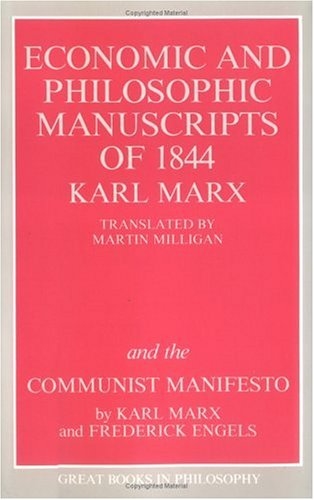YAO MANLIN: Marxist economics offers guidance on path to national development

Cover of the Economic and Philosophic Manuscripts of 1844
At a study group for members of China’s top governing body last November, Chinese President Xi Jinping called on Marxist scholars to break new ground in economic philosophy by translating practices and experiences in China’s economic development into economic theory. It is time for us to take a serious look at the valuable legacy of Marxist economics to better guide China’s economic progress.
The first legacy of Marx that lives on today is his approach to philosophy. Marx tends to combine economics and philosophy, answering economic enquiries with philosophical and logical thinking. In The Economic and Philosophic Manuscripts of 1844, he used the concept of the alienation of labor to call attention to the failure of mainstream economics to explain economic reality. He pointed out that private property is the consequence of alienation as well as the prerequisite for consolidating private ownership and reproducing more alienated labor.
In Das Kapital, Marx examined capital movement under the theories of dialectics, epistemology and logics as an integral whole, to create scientific methodologies and explain history as well as reality through these theories. In this way, Marxist economics is in itself rich in logical thinking and philosophical connotations.
The second is from the political dimension. Marx incorporated economic problems into the framework of politics. On the one hand, he insisted on solving economic problems through political means. One the other, he adhered to the basic position of serving the proletariat. His political orientation was manifested in many of his ideas, such as the view that “communism is the positive expression of annulled private property,” as well as later analysis of the two-fold character of labor, constant capital versus variable capital, and other concepts.
He not only brought to light the inherent contradictions of capitalism and the mystery of surplus value but also revealed the reality of people’s total alienation in a capitalist society. He pointed out the opposition and struggle between the proletariat and bourgeoisie.
The third dimension is criticism. Rooted in the humanist tradition of modern European and German classical philosophy, Marx wrote many of his texts in the form of critiques, like the Critique of Hegel’s Philosophy of Right, A Contribution to the Critique of the Political Economy, and Critique of the Gotha Program. The term “critique” Marx used is not simple negation, but to examine the intervals and ranges within which the subjects can remain reasonable. Based on this perception, Marx examines all phenomena in a capitalist society in a scientific way.
After observing the economic, political and social problems in capitalist countries, Marx admitted the historic rationality of capitalism but at the same time perceived the historical limitations of it. Chen Xueming from the School of Philosophy at Fudan University said Marx sentenced capitalism to death in its cradle, adding that although the execution has not yet come after 160 years, it will.
In the past century or more, Eastern and Western intellectuals alike have been exploring the legacy of Marx and other Marxists. No matter what attitudes these intellectuals hold, the extraordinary charm of Marxism is evident therefrom.
Yao Manlin is from the Party School of Jiangxi Committee of the CPC.
